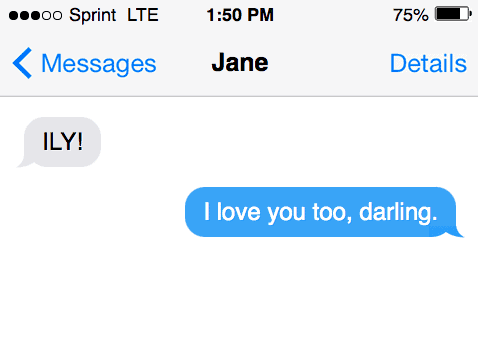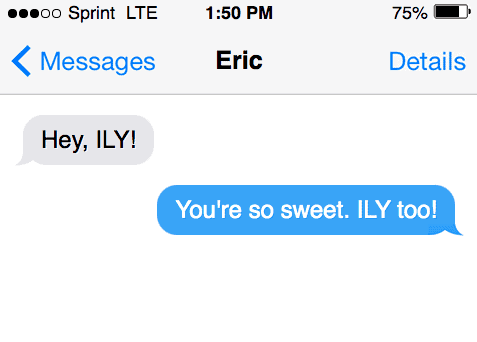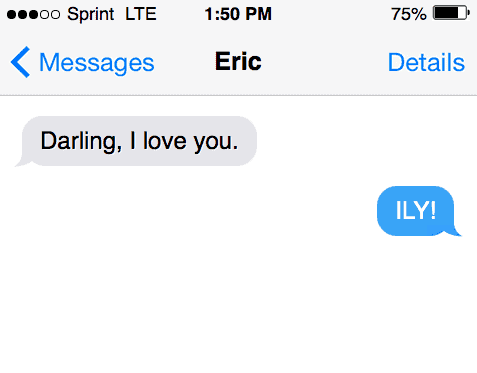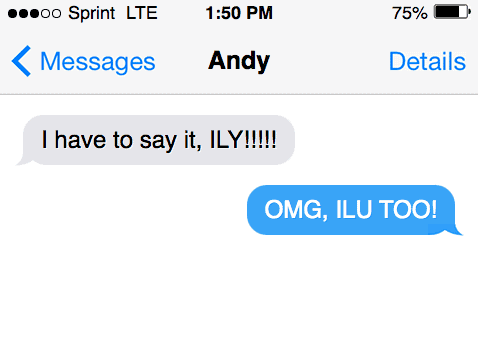What does “ILY” mean? If a text message arrived saying, “ILY” or “ILU,” it’s something to be proud of. You’re receiving an endearing and loving message from someone who cares about you. These internet slang accronyms can get confusing to comprehend. American English has evolved, thanks to the digital generation.
Learn what “ILY” means in this short guide…
“ILY” meaning and definition
“ILY” stands for “I love you.” This is common informal communication from one person to another. It is used to express love, affection, and endearment. It is used very similarly to how “I love you” is said during face-to-face conversations.

If a person is saying, “I love you” to you in person, this slang term is intended to mean the exact thing.
“ILY” is a type of initialism.
Other, lesser used meanings of the acronym include:
While these are meanings of the abbreviation that are far less used, it’s important to ensure the context fits the conversation. If the entire sentiment of the discussions is around love, then it’s likely that these three letters mean love and affection.
If the conversation is about yoga, there’s potential the person is referring to “Inner Light Yoga.”
Variations
Variations of this accronym can be “ILU,” where the “U” is standing in for the word, “You.” What does “ILY” stand for? Remember, it stands for “I Love You.”

Capitalization
Typically, the “ILY” abbreviation is said in ALL CAPS or all lowercase letters.
Correct use: ILY
Correct use: ily
Incorrect use: iLY
Incorrect use: Ily
Usage
The use of the “ILY” abbreviation appears on social media, direct messages, and text messages. It’s a symbol of grateful affection, love, and endearment.
Social media: Facebook, Twitter, Snapchat, TikTok, and more.
Text messages: One on one text conversations.
Internet: Direct messages, forums, and more.

History of “ILY”
Urban Dictionary dates the abbreviation back to 2003. It has always stood for “I love you.” Where one person is texting their feeling of actual love to another. The other form of “ILY,” which is “ILU” has gained popularity in equal proportions. People tend to use “ILY” more, since it is the more common written way to express love between two people.
Examples of “ILY” getting used in a conversation
Here are examples where “ILY” is used in a conversation:
Example one
Girl 1: “ILY!”
Guy 1: “Wow, I really love you too!”
In this conversation, a girl is saying “ILY.” This is a strong sign that the girl feels love and affection to the other person (in this case, Guy 1). “ILY” can get used on its own as a complete sentence. Or get used in the middle of a sentence.
Example two
Friend 1: “Hey, I have to say it my guy, ILY!”
Friend 2: “I’ll say it too, ILY too!”
While it’s less common for friends to use this acronym, it’s a loving comment between two people. It can get used in the middle of a sentence like the example above.

Example three
Guy 1: “ILY, girl!”
Girl 1: “Aww, seriously? ILY too!”
This example shows how a guy could use the “ILY” abbreviation to share their love with a girl.
Similar acronyms and abbreviations
ILY2: Meaning “I love you, too!” A type of response to the abbrevation “ILY”
ILU: Simply a variation of the acronym “ILY.” Where the “U” is replacing the word “You.”
UWU: Used to show affection in Anime communities.
Sources
- uwu – Urban Dictionary
- What does ily mean? | Best 2 Definitions of Ily – YourDictionary
- ILY – Wiktionary
- I love you – Wiktionary
- Ilu Definition & Meaning – Dictionary.com
- ILU Definitions and Synonyms – Macmillan Dictionary
Inside this article
Fact checked:
Content is rigorously reviewed by a team of qualified and experienced fact checkers. Fact checkers review articles for factual accuracy, relevance, and timeliness. Learn more.
Core lessons
Glossary
- Abstract Noun
- Accusative Case
- Anecdote
- Antonym
- Active Sentence
- Adverb
- Adjective
- Allegory
- Alliteration
- Adjective Clause
- Adjective Phrase
- Ampersand
- Anastrophe
- Adverbial Clause
- Appositive Phrase
- Clause
- Compound Adjective
- Complex Sentence
- Compound Words
- Compound Predicate
- Common Noun
- Comparative Adjective
- Comparative and Superlative
- Compound Noun
- Compound Subject
- Compound Sentence
- Copular Verb
- Collective Noun
- Colloquialism
- Conciseness
- Consonance
- Conditional
- Concrete Noun
- Conjunction
- Conjugation
- Conditional Sentence
- Comma Splice
- Correlative Conjunction
- Coordinating Conjunction
- Coordinate Adjective
- Cumulative Adjective
- Dative Case
- Determiner
- Declarative Sentence
- Declarative Statement
- Direct Object Pronoun
- Direct Object
- Diction
- Diphthong
- Dangling Modifier
- Demonstrative Pronoun
- Demonstrative Adjective
- Direct Characterization
- Definite Article
- Doublespeak
- False Dilemma Fallacy
- Future Perfect Progressive
- Future Simple
- Future Perfect Continuous
- Future Perfect
- First Conditional
- Irregular Adjective
- Irregular Verb
- Imperative Sentence
- Indefinite Article
- Intransitive Verb
- Introductory Phrase
- Indefinite Pronoun
- Indirect Characterization
- Interrogative Sentence
- Intensive Pronoun
- Inanimate Object
- Indefinite Tense
- Infinitive Phrase
- Interjection
- Intensifier
- Infinitive
- Indicative Mood
- Participle
- Parallelism
- Prepositional Phrase
- Past Simple Tense
- Past Continuous Tense
- Past Perfect Tense
- Past Progressive Tense
- Present Simple Tense
- Present Perfect Tense
- Personal Pronoun
- Personification
- Persuasive Writing
- Parallel Structure
- Phrasal Verb
- Predicate Adjective
- Predicate Nominative
- Phonetic Language
- Plural Noun
- Punctuation
- Punctuation Marks
- Preposition
- Preposition of Place
- Parts of Speech
- Possessive Adjective
- Possessive Determiner
- Possessive Case
- Possessive Noun
- Proper Adjective
- Proper Noun
- Present Participle
- Prefix
- Predicate



